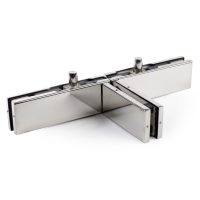In the ever-evolving landscape of architectural design and interior decor, the Swing Door System Singapore stands as a timeless and versatile choice for providing access, enhancing aesthetics, and improving functionality. Whether you’re an architect, interior designer, homeowner, or a professional in the construction and renovation industry, understanding the nuances and advantages of swing door systems in Singapore is essential. In this comprehensive explanation, we delve into the world of swing doors, exploring their various types, benefits, and applications.
Introduction to Swing Door Systems
Swing door systems are a classic and fundamental component of architectural design, offering a hinged door that operates by swinging open and closed. Unlike sliding doors, which move horizontally, swing doors pivot around a fixed point, usually located on one side of the door frame. This simple yet effective mechanism makes swing doors suitable for a wide range of applications in both residential and commercial settings.
Types of Swing Door Systems
Swing door systems come in various types, each tailored to specific needs and spatial considerations. Here are some common variations:
-
Single Swing Doors: Single swing doors consist of a single door panel that pivots on a hinge. They are widely used in residential homes and commercial buildings as entry doors, room doors, and closet doors.
-
Double Swing Doors: Double swing doors, also known as French doors, consist of two door panels, each hinged on one side of the door frame. They are popular for their elegant and classic appearance, making them a favorite choice for patio doors, balcony doors, and interior spaces where a touch of sophistication is desired.
-
Bi-Fold Swing Doors: Bi-fold swing doors feature multiple panels hinged together. They can be folded together, accordion-style, to create a wide opening. These doors are used in various settings, including closets, storage areas, and even as room dividers.
-
Swing Doors with Automatic Operators: In commercial environments, such as supermarkets, hospitals, and airports, swing doors often incorporate automatic operators. These operators provide hands-free access, improve accessibility, and enhance traffic flow. They are particularly important for ensuring compliance with accessibility standards in public spaces.
-
Custom Swing Doors: For unique or non-standard openings, custom swing doors can be designed and fabricated to meet specific design and functional requirements. These doors offer flexibility in terms of size, material, and finishes.
Advantages of Swing Door Systems
Swing door systems offer a host of advantages that contribute to their enduring popularity in Singapore and beyond:
1. Aesthetic Versatility: Swing doors are available in a wide variety of designs, materials, and finishes. This versatility allows them to seamlessly integrate with different architectural styles, whether it’s a classic, contemporary, industrial, or minimalist design. Homeowners and designers can choose swing doors that enhance the overall aesthetic of a space.
2. Spatial Efficiency: While Sliding Shower Screen require clear floor space for the door panel’s swing path, they offer advantages in terms of spatial efficiency when compared to sliding doors. This makes them a practical choice for spaces with ample floor space.
3. Accessibility and Safety: Swing doors are accessible and user-friendly. Their familiar operation is suitable for people of all ages and abilities. Swing doors are particularly advantageous for buildings and spaces where accessibility standards must be met, ensuring inclusivity for all.
4. Natural Ventilation and Airflow: In a tropical climate like Singapore’s, swing doors can enhance natural ventilation. By swinging open, they allow for the flow of fresh air and cooling breezes, reducing the reliance on air conditioning and promoting energy efficiency.
5. Security and Privacy: Swing doors offer inherent security benefits due to their robust frame and locking mechanisms. They provide a strong barrier against unwanted intrusions. Additionally, swing doors are suitable for creating separate zones and providing privacy within a space.
Applications of Swing Door Systems
The versatility of swing door systems makes them suitable for a wide range of applications:
-
Residential Spaces: Swing doors are commonly used for main entry doors, bedroom doors, closet doors, and even as interior doors between various rooms. They contribute to the overall character and functionality of residential spaces.
-
Commercial Spaces: In commercial settings, swing doors are often used for entrances to shops, restaurants, offices, and public buildings. Their elegant appearance creates an inviting and welcoming atmosphere.
-
Exterior Doors: Swing doors are popular for exterior applications, including patio doors, balcony doors, and entry doors to gardens and outdoor dining areas. They are excellent for creating a sense of connection with the outdoors.
-
Healthcare Facilities: Swing doors with automatic operators are common in healthcare facilities. These doors offer ease of access for patients and medical equipment, contributing to efficient and safe operations.
-
Retail Spaces: In retail environments, swing doors are often used for storefronts. They create an open and inviting entrance that encourages foot traffic and showcases merchandise effectively.
Design Considerations
When selecting a swing door system, several design considerations should be kept in mind:
-
Material: The material of the door panel and frame should match the design goals and functional requirements of the space. Common materials include wood, metal, glass, and composite materials.
-
Hardware and Locking Mechanisms: High-quality hinges and locking mechanisms are essential for the smooth operation and security of swing doors.
-
Swing Direction: The direction in which the door swings open should be chosen carefully to ensure that it does not obstruct traffic flow or furniture placement.
-
Size: The size of the door should be proportional to the space and the size of the doorway. Custom-sized doors may be necessary for non-standard openings.
-
Accessibility Features: If the door is intended for use in a commercial or public setting, accessibility features, such as automatic operators and compliance with disability standards, may be required.
Conclusion
Swing door systems are a classic and timeless choice for providing access, enhancing aesthetics, and improving functionality in both residential and commercial spaces. Their versatility, accessibility, and aesthetic adaptability make them a valuable addition to any interior or exterior design. Whether used as a striking entry door, a room divider, or a functional closet door, swing door systems have the power to transform spaces and create an inviting and efficient living environment.




